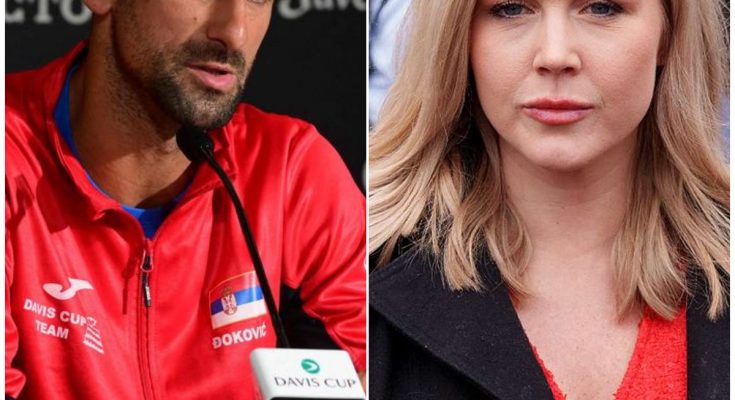In the hyper-polished world of televised interviews, authenticity can feel like a rare and endangered species. We expect practiced anecdotes and media-trained smiles. But every so often, the script is torn to shreds, and a routine conversation erupts into a raw, unfiltered confrontation that holds a mirror up to our most divisive cultural debates. Such a moment recently exploded on live television during what was meant to be a celebratory sit-down with tennis icon Novak Djokovic. Instead, viewers witnessed an unprecedented verbal showdown, a searing personal attack that transformed a talk show set into a cultural battlefield.
The stage was set for a conversation with a living legend. Djokovic, the personification of athletic dominance, arrived with his trademark poise, ready to discuss his relentless pursuit of greatness. But the friendly atmosphere was shattered by the arrival of Karoline Leavitt, a political commentator known for her sharp-tongued, unapologetic style. She had not come to talk about tennis. Within minutes, she deftly steered the interview away from polite conversation and into the turbulent waters of outright confrontation.

Leavitt launched an opening salvo that caught both Djokovic and the global audience completely by surprise. With a cutting tone, she accused the champion of representing the very “exclusivity and privilege” his sport is so often criticized for. “You speak about hard work and perseverance,” she declared, looking him directly in the eye, “but tennis is built on money, access, and elitism. You’ve become a symbol of privilege—someone who benefits from a system that shuts out ordinary people.”
The words hung in the air, a direct assault not just on his sport, but on the very essence of his character and hard-won success. The studio audience let out a collective gasp. What was supposed to be an interview had morphed into a public interrogation, and millions of viewers were frozen, unable to look away.
Throughout this verbal barrage, Djokovic remained a portrait of unshakeable calm. His posture was steady, his gaze unflinching—a perfect mirror of the laser-like focus he displays on Centre Court before a match point. The silence that followed Leavitt’s accusations was as thick with tension as her words had been with venom. The world watched, waiting for a crack in his composure, a flash of anger, a defensive retreat. None came.
:max_bytes(150000):strip_icc():focal(784x322:786x324)/Karoline-Leavitt-2-041025-be2bed083201473b83f1e9be6676a42a.jpg)
Instead, when he finally spoke, his voice was calm, his Serbian accent deliberate and soft, yet his words carried the undeniable weight of a 24-time Grand Slam champion. “I wasn’t born into privilege,” he began, his quiet power silencing the room. “My family sacrificed everything so I could chase this dream. We sold belongings, we borrowed money, and we trained in conditions that were far from glamorous. Every trophy I’ve lifted came with struggle—not just mine, but my family’s. That is not elitism. That is sacrifice, dedication, and resilience.”
It was a masterful and heartfelt rebuttal, a definitive refutation of her claims built not on rhetoric, but on the foundation of his own remarkable life story. He didn’t stop there. Acknowledging the financial barriers within his sport, he detailed the extensive work of his foundation, which for years has been dedicated to building bridges for the next generation. He spoke of funding grassroots programs, providing scholarships, and giving young players from disadvantaged backgrounds the same access to coaching and equipment that he had to fight so hard for.
“I don’t pretend to be perfect,” Djokovic concluded, his eyes locked with Leavitt’s. “But don’t mistake dedication for privilege. Tennis is my life, and I will always use it to inspire and uplift those who dream, just like I once did.”

The studio, which had been silent moments before, erupted in a wave of applause. It was a clear and powerful endorsement of his composure, his authenticity, and his ability to dismantle an attack without ever losing his dignity. Online, the exchange exploded, sparking a global debate. His supporters praised his incredible grace under fire, while Leavitt’s followers hailed her for daring to challenge the polished facade of elite sports.
This clash was about more than just two public figures. It was a perfect encapsulation of a larger cultural tension: the skepticism toward celebrity influence, the debate over earned success versus systemic advantage, and the question of what we expect from our modern heroes. Leavitt, embodying the political firebrand, sought to deconstruct the myth. Djokovic, embodying the meritocratic dream, responded by telling his truth.
In the end, the confrontation served only to bolster both of their brands. Leavitt solidified her image as a fearless commentator, unafraid to challenge anyone. But it was Djokovic who emerged with his reputation not just intact, but enhanced. He had faced a vicious, personal attack and, with nothing more than quiet dignity and the power of his own story, had won the point, the game, and the match. It was a powerful reminder that sometimes, the toughest battles are fought without a racket in hand.



